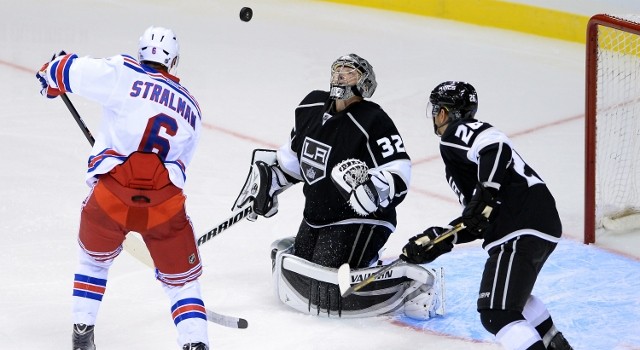Looking back at the two previous postseasons, Jonathan Quick’s performances have been superb. A backstop to the all-systems-firing Kings in 2012, he won the Conn Smythe Trophy by virtue of his 1.41 goals-against average and .946 save percentage.
But the Kings and their opponents combined to average only 3.5 goals per game through the first two rounds of the 2013 postseason, and if not for Quick’s .944 save percentage and one shutout against St. Louis, and his .951 save percentage and two shutouts against San Jose, we wouldn’t have been talking about a Western Conference Final rematch with Chicago this spring. He was at his absolute best in April and May last year before a rough series against the offensively gifted Blackhawks reduced his postseason save percentage down to a still outstanding .934.
It has been tougher sledding this postseason. Quick opened the playoffs with a .914 save percentage against San Jose – numbers that don’t really tell the whole story, as he stopped 94.9 percent of his shots in Games 3 through 7 – and followed it up with a series against Anaheim in which he played perhaps his best two games of the postseason in Games 1 and 2. He was sub-par (and was pulled in Game 4) in the following three games before rebounding by allowing only three goals over Games 6 and 7.
Against Chicago, his save percentage was .889, the lowest it had been in any series since facing Vancouver in 2010. Los Angeles dug deep into its league-leading offense to get past the similarly offensively capable Hawks.
“I think it’s just been a lot of unfortunate bounces,” Goaltending Coach Bill Ranford said. “You look at the San Jose series, early on we weren’t very good as a team, but we weren’t getting that big save for him. From probably halfway through Game 3 of the San Jose series on, he’s been good for us. He’s given us a chance to win every night. You look at the last playoff run last year, and even the year we won it, there were some real bad goals that he gave up. He hasn’t really given up any bad goals, and that’s been huge. But there’s just been more this year around, and especially in the Chicago series, you had two of the best goalies in the world, and the number of goals that were scored in that series, it was crazy. You look at the bounces that happened, it was just two very resilient teams that weren’t willing to give up.”
Of course, you’re not likely to face a more offensively capable group than San Jose (sixth in regular season scoring), Anaheim (first) and Chicago (second).
“That’s the other aspect of it,” Ranford said. “But still, we’ve always handled that pretty well. It’s just one of those things. Teams are finding ways to get pucks to the net, and we’ve got to find ways to defend better.”
Is there any correlation between the team’s raised pace of play in the playoffs, or the extra speed and skill brought about by Marian Gaborik’s presence?
“I think your offense always starts from your own zone,” Ranford said. “Gaborik’s got skill, but it all starts from your end, and if we’re good in our end, you create offense in the other end. But when we’re not good in our own end, we’re not quick, we’re not fast, then you’re defending more than going on offense. I think it all starts from defense.”


Rules for Blog Commenting
Repeated violations of the blog rules will result in site bans, commensurate with the nature and number of offenses.
Please flag any comments that violate the site rules for moderation. For immediate problems regarding problematic posts, please email zdooley@lakings.com.